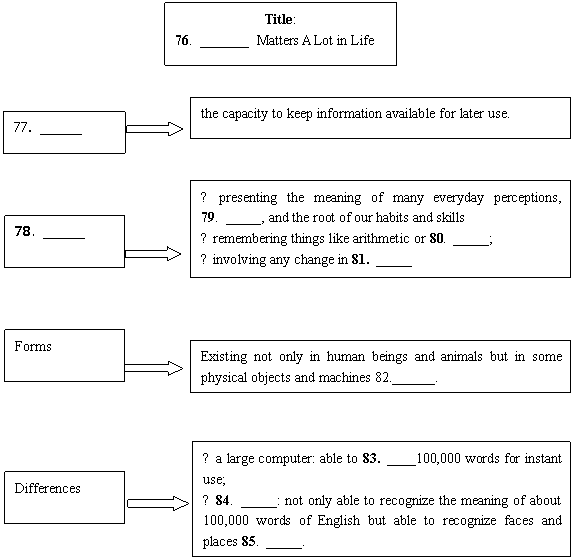题目内容
When a rather dirty, poorly dressed person kneels at your feet and puts out his hands to beg for a few coins, do you hurry on, not knowing what to do, or do you feel sad and hurriedly hand over some money? What should our attitude to beggars be? There can be no question that the world is full of terribly sad stories. It must be terrible to have no idea where our next meal is going to come from. It seems cruel not to give some money to beggars.
Certainly, most of the world’s great religions (宗教) order us to be open-hearted and share what we have with those less fortunate than ourselves. But has the world changed? Maybe what was morally (道德方面) right in the old days, when one knew exactly who in the village had suffered misfortune and needed help, is no longer the best idea. Quite a few people will not give to beggars. Let us look at their arguments.
First, some believe that many city beggars dress up on purpose to look pitiable and actually make a good living from begging. Giving to beggars only encourages this sort of evil (恶行). Secondly, there is the worry that the money you give will be spent on beer, wine or drugs. Thirdly, there is the opinion that there is no real excuse for begging. One might be poor, but that is no reason for losing one’s sense of pride and self-dependence.
Related to this is the opinion that the problem should be dealt with by the government rather than ordinary people. Some people think beggars should go to the local government department and receive help.
It is hard to come to any final conclusion; there are various cases and we must deal with them differently. A few coins can save a life in some situations, and even if the money is wasted, that does not take sway the moral goodness of the giver.
1.What is mainly discussed in the passage?
A.Moral deeds of people.
B.Religious activities of the church.
C.Moral goodness of the giver.
D.Arguments on giving to beggars.
2.What can we infer from the sentence “But has the world changed?” in the second paragraph?
A.People no longer know who suffers misfortune in the village.
B.Some people will not do what was morally right in the past.
C.We don’t meet with those who need help any more.
D.Now it is the government’s duty to help the beggars.
3.Which of the following is NOT mentioned in the passage?
A.Some people dress up to pretend to be beggars.
B.Some beggars want money to help their children go to school.
C.Some beggars use the money to buy drugs.
D.Some beggars have no excuse for begging.
4.In the last paragraph, the writer thinks that it is hard to come to any final conclusion, because .
A.the cases can be so different
B.there are so many beggars
C.there is so much money wasted
D.there are so many different arguments
1.D
2.B
3.B
4.A
【解析】
试题分析:本文主要讨论的是人们对于是否应该给乞丐钱的问题的两方面的阐述。
1.D 主旨大意题。根据文章内容可知讨论的是面对乞讨的人,我们应该做出如何的选择,是应该慷慨的给,还是不给。文章进行了仔细的探讨。故D正确。
2.B 推理题。根据本段Maybe what was morally (道德方面) right in the old days, when one knew exactly who in the village had suffered misfortune and needed help, is no longer the best idea. Quite a few people will not give to beggars.说明在现代社会很多人已经失去了廉耻,会做以前不会做的事情,如乞讨。故B正确。
3.B 细节题。根据文章倒数第三行First, some believe that many city beggars dress up on purpose to look pitiable and actually make a good living from begging. Giving to beggars only encourages this sort of evil (恶行). Secondly, there is the worry that the money you give will be spent on beer, wine or drugs. Thirdly, there is the opinion that there is no real excuse for begging. One might be poor, but that is no reason for losing one’s sense of pride and self-dependence.说明ACD被提及了,只有B项没有涉及。故B符合要求。
4.A 推理题。根据文章最后一段It is hard to come to any final conclusion; there are various cases and we must deal with them differently. A few coins can save a life in some situations, and even if the money is wasted, that does not take sway the moral goodness of the giver.说明也许有些人真地需要帮助,所以很难下定论。故A正确。
考点:考查议论文
点评:本文讨论的内容是是否要给乞丐钱。本文测试考生在阅读基础上的逻辑推理能力,要求考生根据文章所述内容的逻辑关系,对未说明的趋势或结局作出合理的推断;或根据作者所阐述的观点理论,对文章未涉及的现象、事例给以解释。考生首先要仔细阅读短文,完整了解信息,准确把握作者观点。

 开心快乐假期作业暑假作业西安出版社系列答案
开心快乐假期作业暑假作业西安出版社系列答案 名题训练系列答案
名题训练系列答案
| |||||||||||||||||||||||||||||||||||||||||||||||||||||||||||
